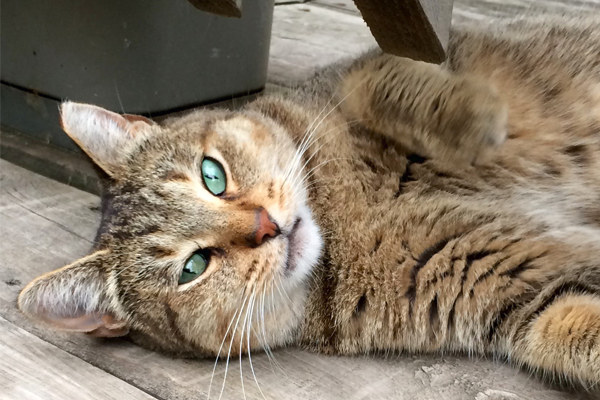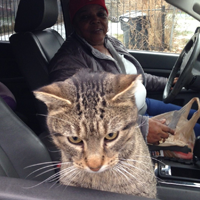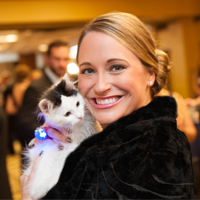PAWS helps Englewood’s community cats
by John Caruso | Jan 08, 2016
His name is Cat-Dog, and he belongs to no one and everyone.

He is one of many community cats roaming Englewood, a Chicago neighborhood with little access to veterinary services. Cat-Dog got his name because he is friendly, engaging, and loyal: qualities many residents associate with dogs. He’s also been known to chase his share of neighborhood dogs.
“He’s always there, ready to jump in someone’s car or sleep on a porch,” Margaret, a resident of Englewood, told PAWS Chicago Community Outreach Manager Laurie Maxwell. “He looks like a cat, but acts like a dog.”
Cat-Dog is one of more than 1,000 cats spayed or neutered by PAWS Chicago in Englewood with funding from PetSmart Charities over two years. The program focused on cats who live outside, including stray and feral animals.
Some of these cats are fed and watched over by the entire neighborhood. They provide companionship and often serve utilitarian purposes such as controlling rat populations. Before this program, they also were continuing to have kittens.
PAWS focused on Englewood because it is one of the most underserved areas of the city, and community members face significant barriers to accessing spay/neuter services, including poverty and a lack of transportation.
In the two years prior to the launch of the PAWS Englewood program, 212 cats from the area received spay/ neuter surgeries at the PAWS Lurie Clinic in Little Village.
Only 10 percent of pets in Englewood are spayed and neutered, compared with the national average of 85 to 90 percent. Because of the high number of unaltered animals, even the best efforts to keep a cat indoors can fail. A common lament is, “The cat got out one time and she came back pregnant.”
The PetSmart project is part of a larger PAWS outreach effort in Englewood, called PAWS for Life, aimed at creating lasting change in the community. By having a consistent presence in the neighborhood–going door to door–PAWS for Life is able to provide resources to pet owners who would not otherwise have access to these services.
Since the PAWS for Life initiative began in November 2014, community members have been enthusiastic about the benefits of spay/neuter and readily participate. “We have been overwhelmed by the positive response from the Englewood community. Ninety percent of the unaltered pets we meet end up getting spayed/neutered through our program,” Maxwell says.
If PAWS’ staff and volunteers hadn’t been active in Englewood, then stories like Margaret’s—and Cat-Dog’s—may have ended very differently. Margaret, an Englewood resident, developed a particular affection for Cat-Dog when he began showing up at her home for a meal or companionship. He would wait on her porch, but always declined invitations to come inside. Then one cold fall night, Margaret looked outside and saw Cat-Dog curled up in a ball on the porch chair. “I knew he was cold. So I opened the door for him, said ‘Come on kitty’ and he ducked in the house so fast! He’s been coming in my house ever since.”
When PAWS staff met Margaret, she explained she would like to give Cat-Dog a permanent home inside, but all attempts she made were futile. Cat-Dog wanted his freedom. PAWS arranged free neuter and veterinary care for Cat-Dog through the PetSmart grant. The hope was that once he was neutered, Cat-Dog would acclimate better to indoor life. However, Cat-Dog still chose to come and go.
Margaret made peace with this arrangement, but does whatever she can to keep him safe. “If I don’t see him I worry about him. I worry about him like my kid. I go out looking for him if he doesn’t come back,” she says. “I’m his mom. He knows he can always come home, get some sleep, have a good meal. He knows he’s safe here and no one will mess with him here.”
And when Cat-Dog is away from Margaret’s home, he is definitely not adding to the feline overpopulation problem. He has been vaccinated. He is healthy. And he has people who are looking out for him.
ABOUT TRAP NEUTER RETURN
PAWS Chicago spayed and neutered 4,867 community cats during 2015 across the Chicago area. The PAWS Chicago Trap Neuter Return (TNR) program provides a humane approach to outdoor cat control and a proven method for reducing the number of homeless animals.
Working closely with volunteers and community members, PAWS traps community cats and provides them with spay/ neuter surgeries, vaccinations and microchipping. Their ears are also tipped to indicate they have already been spayed or neutered. If cats are not tame enough for adoption, they are returned to where they were living, where community caretakers and volunteers continue to feed them, provide shelter and keep an eye on their well-being.
Ultimately, TNR results in healthy and well-cared for colonies, while gradually diminishing the overall number of cats because they are no longer reproducing. There also is an immediate reduction in complaints about behaviors associated with unsterilized cats, including spraying and fighting. And by having a controlled cat colony, there will be significantly fewer rodents in the neighborhood.
Learn more about this program at pawschicago.org/tnr.
CANNINGS HELPING FERAL CATS
 The plight of Chicago’s homeless cats and kittens inspired Development Board member Melissa Canning to get involved with PAWS Chicago in 2012. Once she visited the city pound with the PAWS team and saw the magnitude of the cat overpopulation problem, she couldn’t stop thinking about how she could make a difference.
The plight of Chicago’s homeless cats and kittens inspired Development Board member Melissa Canning to get involved with PAWS Chicago in 2012. Once she visited the city pound with the PAWS team and saw the magnitude of the cat overpopulation problem, she couldn’t stop thinking about how she could make a difference.
Michael Canning saw his wife’s passion and commitment. As a businessman, he also saw that PAWS Chicago’s Trap Neuter Return (TNR) program was a tangible solution. For Melissa’s birthday that year, together they founded the Melissa Canning Community Cat Prevention Program through PAWS.
This dynamic couple has continued to support the Program each year since it started. In 2015 alone, the Program funded 371 surgeries and the purchase of 60 humane feral cat traps for the PAWS TNR volunteer force. It also provides microchips, ear-tipping and vaccinations for the cats.
“The Cat Prevention Program is set up to tackle a large problem in the city,” says Melissa. “Hopefully, through these programs, we will one day greatly reduce the number of feral cats and unwanted kittens born in the city of Chicago.”
